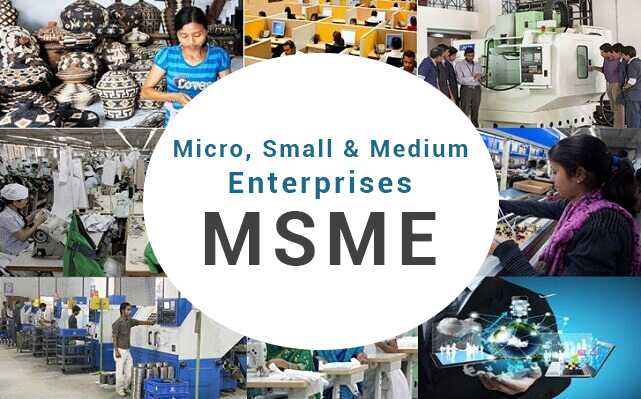This article is written by Ritika Sharma, pursuing a Diploma in Advanced Contract Drafting, Negotiation and Dispute Resolution from Lawsikho.com.
The Micro, Small and Medium Enterprises in India are governed by the MSMED (Micro, Small, and Medium Enterprises Development) Act of 2006. Thereby, the enterprises are classified into:
- Manufacturing enterprise
- Service enterprises
The MSME sector contributed a staggering 29% to the Indian GDP and is claimed to have created 11 crore job opportunities. As per the MSMED Act, 2006, the manufacturing enterprise has the subsequent classification, which is predicated on the investment in Plant and Machinery [1] by the enterprise:
|
Enterprise |
Investment in Plant and Machinery |
|
Micro Enterprise |
< 25 lakhs |
|
Small Enterprise |
>25 lakhs but < 5 crores |
|
Medium Enterprise |
>5 crores but < 10 crores |
Whereas, for the service sector the MSMED Act specifies another set of classification:
|
Enterprise |
Investment in equipment |
|
Micro Enterprise |
< 10 lakhs |
|
Small Enterprise |
>10 lakhs but < 2 crores |
|
Medium Enterprise |
>2 crores but <5crores |
Table of Contents
Benefits to MSMEs under- Atma Nirbhar Bharat Abhiyaan
In June 2020, in accordance with the Atma-Nirbhar Bharat (Self Reliant India) Abhiyan economic package, the Minister of finance aimed towards benefitting the MSME sector by changing the definition of MSME.
This move came just after the definition was revised in May 2020, where the Cabinet had approved the amendment to vary the standards to classify MSME’s from “investment in plant and machinery” to “annual turnover” [2].
Here is the revised MSME definition as per the June 2020 approval:
|
Type of Enterprise |
Investment |
Turnover |
|
Micro |
Up to Rs 1 crore |
Up to Rs 5 crore |
|
Small |
Up to Rs 10 crore |
Up to Rs 50 crore |
|
Medium |
Up to Rs 50 crore |
Up to Rs 250 crore |
By this, many enterprises would now come under the ambit of MSME sector and cash in advantages provided by the government. Now, we can look at the benefits available to the MSME sector.
Emergency Credit Line Guarantee Scheme was introduced as well under the Atma Nirbhar Package. This is a working capital term loan to enhance the MSME sector borrowers working capital needs and to meet operational liabilities as well as restarting business. Certain criterias have been laid down to be eligible for the scheme, they are as follows:
- Borrowers with up to Rupees 25 crore outstanding as on Feb 29, 2020 and up to Rupees 100 crore annual turnover for fiscal year 2020 are going to be eligible.
- Loans sanctioned would be up to 20% of the borrower’s total outstanding credit as on Feb 29, 2020.
- Borrower accounts which had NPA or SMA-2 status as on Feb 29, 2020 shall not be eligible under the scheme.
- No processing charges and waiver of foreclosure/prepayment charges.
- No additional collateral requirement.
- Loans will have a 4-year long tenure with a moratorium of 12 months on the principal amount.
- The interest on the loan will be capped.
The government also amended General Financial Rules to ensure that tenders below 200 crores are procured from domestic firms only.
Subordinate Debt for stressed MSMEs
In May 2020, the Finance Minister announced the establishment of subordinate debt for MSMEs which were stressed or were NPA of Rs. 20,000 crores. The image herein attached summarizes the relief.
Source: PIB India
Credit Guarantee Fund Scheme
Credit Guarantee Fund Scheme is available for Micro and Small Enterprises. This scheme makes collateral-free credit to these enterprises offered by the Government of India. Existing as well as new enterprises are entitled to opt this scheme. It offers a credit facility up to Rs. 200 lakhs for every borrower, through funds or non-fund, that is through bank guarantee or letters of credit. This scheme is provided depending upon the feasibility of the project without any third-party guarantee or collateral security.
The guarantee cover available under the scheme is to the limit of 50%/ 75% / 80% & 85% of the authorized sum of the credit facility.
The extent of guarantee cover is 85% for micro enterprises for credit up to Rs 5 lakh. The extent of guarantee cover is 50% of the sanctioned amount of the credit facility for credit from Rs 10 lakh to Rs 100 lakh per MSE borrower for retail trade activity. [3]
Delayed Payments
Under section 15 of the MSMED Act, a sum payable to a micro or small enterprise cannot exceed 45 days from the day of acceptance or day of deemed acceptance. If the buyer does not make payment on time, the buyer will be required to pay compound interest with monthly interests to the supplier. The interest chargeable by MSME enterprise is 3 times the rate that has been notified by the Reserve Bank of India. The buyers would also include, autonomous bodies, agencies, public sector undertakings, government departments or other industrial units. An internet portal by the name ‘MSME SAMADHAAN’ [4] is a supervising system for delayed payments by the Ministry of Micro, Small and Medium Enterprises, which helps to solve disputes between parties.
In the event that the buyer decides to go to court against the order of the Micro and Small Enterprises Facilitation Council (which manages MSME SAMADHAAN), the buyer would have to deposit 75% of the amount which is due in the opinion of the enterprise.
Credit Linked Capital Subsidy Scheme
This scheme is currently on pause, due to the pandemic. The scheme facilitates technology up-gradation in MSEs. This is done by providing 15% of upfront capital subsidy, on institutional finance of up to Rs. 1 crore. The subsidy will be used for induction of improved technology in the approved 51 products and sectors. The list of technologies that are available can be checked at www.dcmsme.gov.in.
The scheme is available even to the village, khadi, tiny and coir industrial units. The aim is to get state of the art technology and upgradation of plant and machinery without the burden of expansion. The approved enterprises can approach banks directly for benefitting under this subsidy.
Technology and Quality Upgradation Support to MSMEs
The scheme encourages the utilization of energy efficient technologies (EETs) in manufacturing units to scale back production costs and look for adoption of clean and green development mechanisms. Capacity building of MSME clusters for energy efficiency, clean development, and related technologies. The program provides a funding support of up to 75% for awareness programs, however it is subject to a maximum of Rs. 75,000 per program.
Interest Subsidy Eligibility Certificate
The Interest Subsidy Eligibility Certificate (ISEC) Scheme is an essential system of financing khadi programs undertaken by khadi institutions. It was established to mobilise funds from banking institutions for plugging the gap between the fund requirements and availability of funds. Under the scheme, credit at a concessional rate of interest of 4% p.a for working capital, is made accessible to the institutions as per their requirements. 4% and difference between the actual lending rate is paid by the Central government by the Khadi and Village Industries Commission (KVIC) through lending banks. All Khadi institutions, having valid Khadi certificate and sanctioned khadi programcan apply to avail this scheme.
Skill Upgradation and Mahila Coir Yojana
Skill Upgradation & Mahila Coir Yojana (MCY) is one of the key components under the Scheme Coir Vikas Yojana. Coir Board trains while in the process of coir and value addition to potential workers, coir artisans/entrepreneurs through its training centres. The Mahila Coir Yojana (MCY) is meant to provide self-employment opportunities to rural women artisans in regions processing coconut husk. The stipend per trainee for the skill development programs will be limited to Rs.3,000/- per month and in the case of training programs of less than one-month duration, stipend will be paid on pro rata basis. The stipend for the trainer will be limited to Rs. 15,000/- per month. An amount of Rs.400/- per head per month will be provided as financial aid to the training sponsoring agency to meet the operational cost of the training for raw material, other incidentals, power charges, etc.
Domestic Market Promotion (DMP)
Pursuant to Section 10 (1) of Coir Industry Act 1953, Coir Board has been taking various actions for promoting coir and coir products and enlarging the domestic market. The main objective is to establish and maintain sales depots and showrooms; participation in exhibitions and fairs organized by other agencies and organizing exclusive fairs for Coir and coir goods in different parts of the country; offering Market Development Assistance to State supported organizations for broadening marketing network, organizing generic publicity through press, and other advertising modes; setting of quality standards; examining and providing a certificate for assuring the quality of coir goods, are a number of measures taken by Coir Board towards achieving their target.
The activities undertaken by the Board are:
- Promoting publicity and participation in domestic exhibitions;
- Extension of performance linked Market Development Assistance;
- Construction or renovation or interior decoration of new and existing showrooms as well as market development centres of the Board and field demonstration/displays.
Conclusion
It can be reasonably concurred that the Atma Nirbhar Package has been a big help and boost to the MSMEs, apart from the already existing schemes provided by the Government of India. The pandemic has hit the MSMEs the hardest and therefore, the steps taken by the government must be appreciated.
References
[1] Notified vide S.O. 1642(E) dtd.29-09-2006
[2] Notified vide S.O. 1602(E) dtd.01-06-2020
[3] https://www.startupindia.gov.in/content/sih/en/government-schemes/cgtsme.html
[4]https://samadhaan.msme.gov.in/MyMsme/MSEFC/MSEFC_Welcome.aspx
Students of Lawsikho courses regularly produce writing assignments and work on practical exercises as a part of their coursework and develop themselves in real-life practical skill.
LawSikho has created a telegram group for exchanging legal knowledge, referrals and various opportunities. You can click on this link and join:
 Serato DJ Crack 2025Serato DJ PRO Crack
Serato DJ Crack 2025Serato DJ PRO Crack











 Allow notifications
Allow notifications


